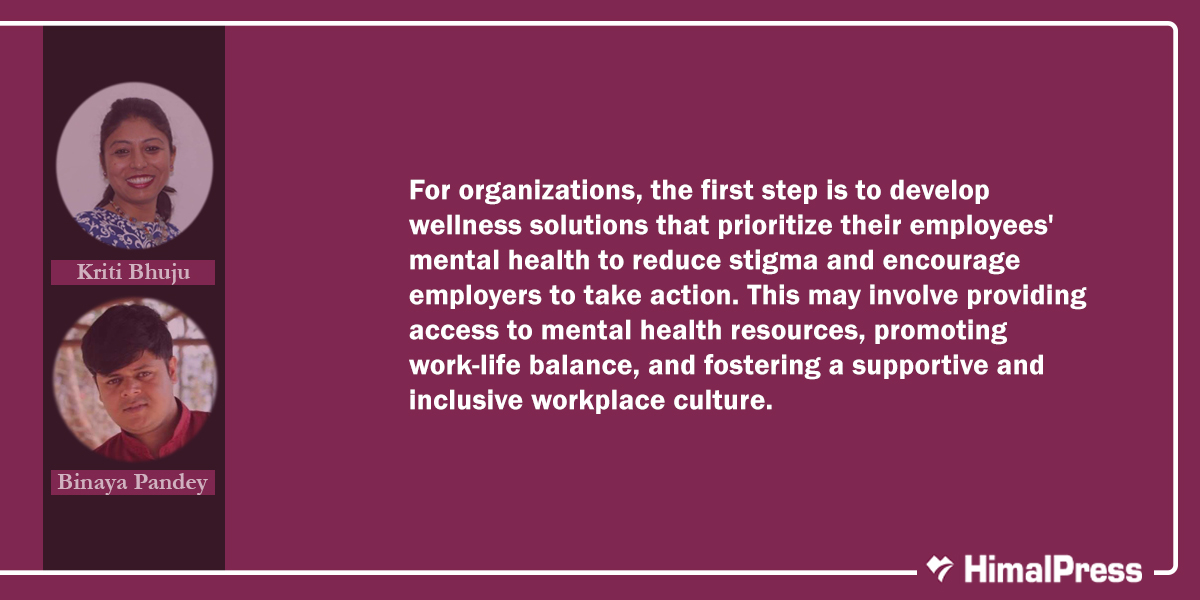
By Kriti Bhuju and Binaya Pandey
In recent years, workplace mental health has gained increasing attention not only in Nepal but across the globe. Given that people spend a significant amount of their productive time at work, mental health in the workplace has become a concern for everyone, especially in this era of growth and technology.
While the growing awareness of mental health issues in the workplace is a positive development, it is crucial to revisit the basics of this trend. Supporting mental health in the workplace shouldn’t be regarded as optional any longer, it has become a necessity. For organizations, the first step is to develop wellness solutions that prioritize their employees’ mental health to reduce stigma and encourage employers to take action. This may involve providing access to mental health resources, promoting work-life balance, and fostering a supportive and inclusive workplace culture.
It is essential to recognize that workplace mental health is important for all employees and can significantly affect the productivity of the organization. Employees dealing with mental health issues may have higher rates of absenteeism, reduced productivity, and increased likelihood of leaving their jobs. Employers who prioritize workplace mental health can create a healthier and more productive work environment.
Importance of mental health at workplace
To attract and retain high-performing employees, organizations must prioritize the mental health and well-being of their workforce. The three pillars of physical, mental, and social well-being make up total health. Unfortunately, many companies tend to view mental health solely as the absence of a diagnosed mental illness or condition. However, poor mental health can exist even in the absence of a specific mental ailment or disorder.
A study by the American Psychological Association (APA) revealed that employees who reported high levels of stress were more likely to experience health issues such as obesity, heart disease, and diabetes.
Workplace mental health has become an increasingly researched topic in recent years, and the findings have been eye-opening. According to a recent report by the World Health Organization (WHO), depression and anxiety disorders cost the global economy $1 trillion in lost productivity annually. The report, ‘Transforming Mental Health for All’, highlights the workplace as a critical setting where transformative actions on mental health are necessary.
According to a study by Deloitte, companies that invest in mental health initiatives can see a return on investment of up to 6:1. This is because employees who are supported in their mental health are more engaged, productive, and committed to their employers. Moreover, research shows that workplace stress can have a detrimental impact on physical health. A study by the American Psychological Association (APA) revealed that employees who reported high levels of stress were more likely to experience health issues such as obesity, heart disease, and diabetes.
Gender and Media Researcher, Samiksha Koirala, says that a supportive work environment is essential for all employees, regardless of gender. However, gender-based discrimination and the absence of a gender-responsive work environment can put the mental health of women and gender minorities at risk. Studies have also shown that women who work for gender-responsive organizations report higher levels of mental well-being. This underscores the need for organizations to be more attuned to the mental health needs of women and people from other genders and sexual minorities.
Workplace related stress
Work-related stress is a pervasive problem that can have significant negative consequences for employees and organizations alike. Stress can manifest in a variety of physical and mental health problems, including heart disease, headaches, anxiety, and reduced decision-making abilities. Common causes of work-related stress include excessive workloads, poor management support or interpersonal relationships with colleagues, bullying, harassment, and long working hours. Addressing these factors and creating a supportive work environment is critical to preventing work-related stress and its detrimental effects on both employees and organizations.
The importance of workplace mental health can be highlighted by several key themes, including its impact on productivity, physical health, financial costs, employee retention, social responsibility, and the COVID-19 pandemic. The pandemic has heightened awareness of the significance of mental health in the workplace, and employers have had to adapt quickly to support their employees. By investing in mental health initiatives, organizations can reap a return on investment, reduce turnover rates, and fulfill their duty to create a healthy and supportive work environment. Prioritizing workplace mental health is crucial for the well-being of employees, the success of organizations, and the overall health of society.
According to a study conducted by the Center for Disease Control and Prevention (CDC), the pandemic has led to a significant increase in anxiety and depression rates among US workers, with essential workers and young adults being particularly affected. Pukar Nepal, a 28-year-old employee at a reputed corporate house in Nepal, says ‘lack of recognition and acknowledgment for hard work and accomplishments can also contribute to an unhealthy work environment and create stress knowingly or unknowingly’. Employers are responding to the growing focus on workplace mental health by implementing initiatives such as mental health training for managers, providing access to counseling and therapy services, and offering flexible working arrangements to promote work-life balance, he added.
It is crucial for employers to address these workplace issues and promote a healthy work-life balance to support the well-being of their employees and the success of their organization.
The workplace issues mentioned earlier, such as heavy workloads, inadequate support, and long working hours, can contribute to work-related stress, which can negatively impact employees’ mental health and ability to cope with challenges. This, in turn, can lead to high turnover rates, legal risks, and reduced profitability for organizations. Balancing work and family responsibilities can exacerbate these issues, resulting in even greater stress and negative outcomes. Therefore, it is crucial for employers to address these workplace issues and promote a healthy work-life balance to support the well-being of their employees and the success of their organization.
How to address?
Organizations can promote the mental health of their employees by implementing policies, strategies, counseling, and organizing training programs. They can educate employees on self-care, provide relaxation spaces, set realistic goals, offer opportunities for non-judgmental venting and participation in decision-making, and appreciate their hard work.
Likewise, employees also have a role in promoting positive mental health and well-being at work. They can encourage management to provide mental health support and participate in programs to learn skills and get support. They can practice coping skills like deep breathing, mindfulness, and positive self-talk, and take care of their physical health. They should also nurture social relationships, set personal and work-related goals, and reflect on positive experiences.
Mental health is a vital component of overall well-being, with significant implications for productivity and job performance. Poor mental health can harm workplace relationships, decision-making, and capabilities, resulting in reduced profitability and productivity. Nonetheless, organizations can take an active role in promoting their employees’ mental health by providing support and creating a conducive work environment. Similarly, individuals can take steps to enhance their mental well-being by participating in wellness programs, practicing self-care, and seeking support. Ultimately, prioritizing mental health and well-being in the workplace is essential for both individuals and organizations to flourish.
(Bhuju holds a doctorate degree and is a development communicator by profession, while Pandey is a psychologist. Both are mental health activists)














